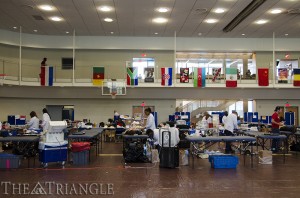Viren Doshi, the vice president of Drexel’s Health Law Society and a first-year student in the Earle Mack School of Law, is fighting the United States’ ban against men who engage in sex with other men donating blood.
Although this is just a preliminary stage, “[the outcome] is getting really large,” Doshi said.
The campaign started three weeks ago, but so far it has received support from 200 people at the law school, not to mention other colleges, newspapers and lesbian, gay, bisexual and transgender organizations.
The U.S. Food and Drug Administration issued the regulation to prohibit the MSM group from donating blood in 1977, which was considered to be the year of the AIDS epidemic. In 1985 the ban was made official. MSM are considered to be at higher risk for HIV because the AIDS epidemic started in gay communities. It was thought that banning MSM blood donations would decrease the potential risk of the spread of HIV through blood transfusion.
“Personally, I see why in the past they thought that [the ban] would be useful, but now I think it’s absurd,” Doshi said. “Everyone that I’ve talked to realized that this is a problem, especially having such a need for blood.”
Doshi has been conducting several campaigns against this ban. So far his team has received support from Drexel’s Earle Mack School of Law, the School of Public Health, the College of Medicine and other places that perform blood donations.
He has also started contacting other universities, newspapers and LGBT organizations throughout Philadelphia and the rest of Pennsylvania. Doshi has also been in contact with members of the Pennsylvania General Assembly.
Swarthmore College, Bryn Mawr College and Temple University, along with many newspapers and other organizations, have contacted Doshi’s team to inquire about helping his cause. “Now we’re just making the push a lot bigger,” Doshi said.
He said, “There was a calculation that if they allowed men who had sex with men to donate blood, there would be a little over 200,000 more pints of blood available, which is a lot. That can make a really big difference.”
He suggested that MSM should be allowed to donate blood equally because not all of them are at risk of HIV. Before transfusing, the blood should be heavily screened, not only for HIV but also for other viruses and infections, according to Doshi.
Continuing with the stigma he feels toward this issue, Doshi said, “It’s absurd that they have considered removing it but the board of FDA voted 9-7 to not remove the ban.”
People who contacted Doshi also agreed that the ban is unneeded and feel passionate about the campaign.
“Seeing the impact that it’s having right now and the impact that it could have if it’s removed, we all agree that it’s absurd,” Doshi said.
The Red Cross is against this ban as well, but because it is a federally mandated ban, they can neither do nor say anything about it, according to Doshi, who also volunteers for the Red Cross. The Red Cross tried to remove the ban five or six years ago but did not receive enough support.
While running a blood drive, Doshi heard of this issue from other people who were trying to remove the ban as well. He said, “It was brought up to us, and now we’re making a bigger push for it.”
Speaking of difficulties of the campaign, Doshi said the biggest problem would probably be that the target population — LGBT persons — is such a small class among a large number of people. Another difficulty is that many people are not informed enough about this ban and see its facades, according to Doshi.
Doshi will carry on with this campaign over the summer. “My goal, specifically, is to get [the campaign] passed to the FDA advisory committee and get their recommendation for removing the ban.”
In the future, Doshi and his team will work with people across the country. They plan to contact local and national organizations as well as student newspapers.
We think that the students will probably realize more of how much of a problem this is than the previous generations who might have their own biases,” Doshi said.
For more information, contact Doshi at [email protected] or 785-893-6744.


